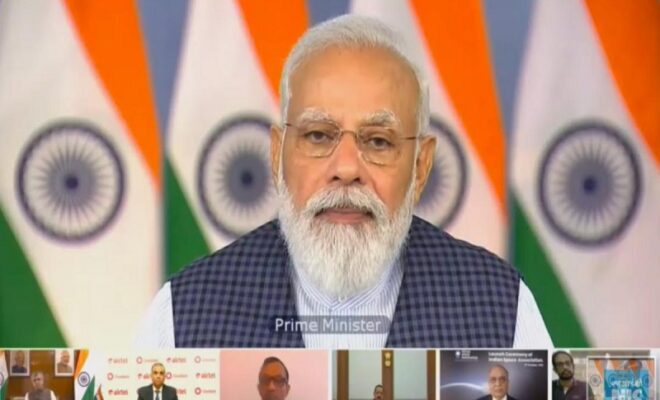PM Modi Inaugurates ISpA, and Encourages Private Sector Participation in it

![]() Delhi – Prime Minister Narendra Modi inaugurated the Indian Space Association (ISpA) on Monday, which comprises many stakeholders of the Indian space domain.
Delhi – Prime Minister Narendra Modi inaugurated the Indian Space Association (ISpA) on Monday, which comprises many stakeholders of the Indian space domain.
The organization members include private telecom companies such as Tata Group’s Nelcom, Bharti Airtel’s One Web, MapMyIndia, L&T, and more, and government bodies such as the Indian Space Research Organisation (ISRO).
Talking at the virtual launch of ISpA, PM Modi invited the private sectors to utilize resources and technology available with the Indian Space Research Organization (ISRO) to assist in making India an indispensable part of the supply chain in future space technology.
The Government will likewise play the part of an aggregator for space services and assets, so our young pioneers won’t need to invest time and energy in purchasing tools and hardware, PM added.
As shown by Air India’s new deal to the Tata Group, Modi Ji also emphasized the Government’s serious commitment towards privatizing state-run organizations.
The expansion of the Internet in India is also essential for Digital India’s dream, where the Government will play a significant part in providing internet directly to the customer.
What is the Importance of ISpA?
Ever since the race to space and planets began between the US and USSR, governments across the world have poured millions of dollars into exploring planets like Mars and our very own satellite, Moon. With time, international government agencies and private sectors have collaborated to search for life outside Earth on Exoplanets and galaxies.
Recently, private sector companies such as Richard Branson’s Virgin Galactic, Elon Musk’s SpaceX, and Amazon’s Chairman Jeff Bezos’ Blue Origin have become the front runner in space flight and tourism.
Similarly, one of the fundamental objectives of ISpA is to enhance the public authority’s endeavours towards making India a worldwide leader in commercial space trips.
Recently, ISRO’s spacecraft have been conveying the payload and communication satellites of different nations; presently, private players hope to propose this space with the new relationship.
ISpA said it would draw in with stakeholders to make policy and framework that satisfies the Modi Government’s vision of driving space exploration commercially.
Related Posts
We will likewise pursue building worldwide linkages for the Indian space industry to acquire essential technology and interests into the nation to generate more skilled jobs, ISpA added.
During the ISpA launch, PM Modi added that affordability and efficiency were the central part of Indian space technology.
The Modi Administration would play a part facilitator and not of the handler, to promote exponential growth of the industry by shifting the technology that has developed in this field to the private sector.
The Modi government will be completing the space com (space-based correspondence) and remote detecting system policy, and the goal is to provide the private sector with a stage on which they could assemble multiple solutions.
Who are the stakeholders in this mission, and how will they contribute?
In India, many worldwide organizations are betting on investing in space-based communications systems as the following country to implement affordable and high-speed Internet connectivity to distant areas. This incorporates SpaceX’s StarLink, Amazon’s Project Kuiper, Sunil Bharti Mittal’s OneWeb, US satellite producer Hughes Communications, and so forth.
ISpA will be represented by global and domestic companies that have developed satellite and space technologies. OneWeb, for instance, is creating its constellation of 648 low-earth-orbit satellites that have already launched 322 satellites into space.
Its services will start this year in the Arctic region, including Canada, Alaska, and the UK. By the end of 2022, OneWeb will offer high-speed internet connectivity services to India and globally.
Amazon and StarLink are in conversation with the Indian Government for a license to allow satellite-based Internet services. SpaceX has plans to build 12,000 satellites, of which more than 1,300 are already in space.
With the advancements in new space technologies, the people of India will soon experience better imaging, mapping, and connectivity facilities.



